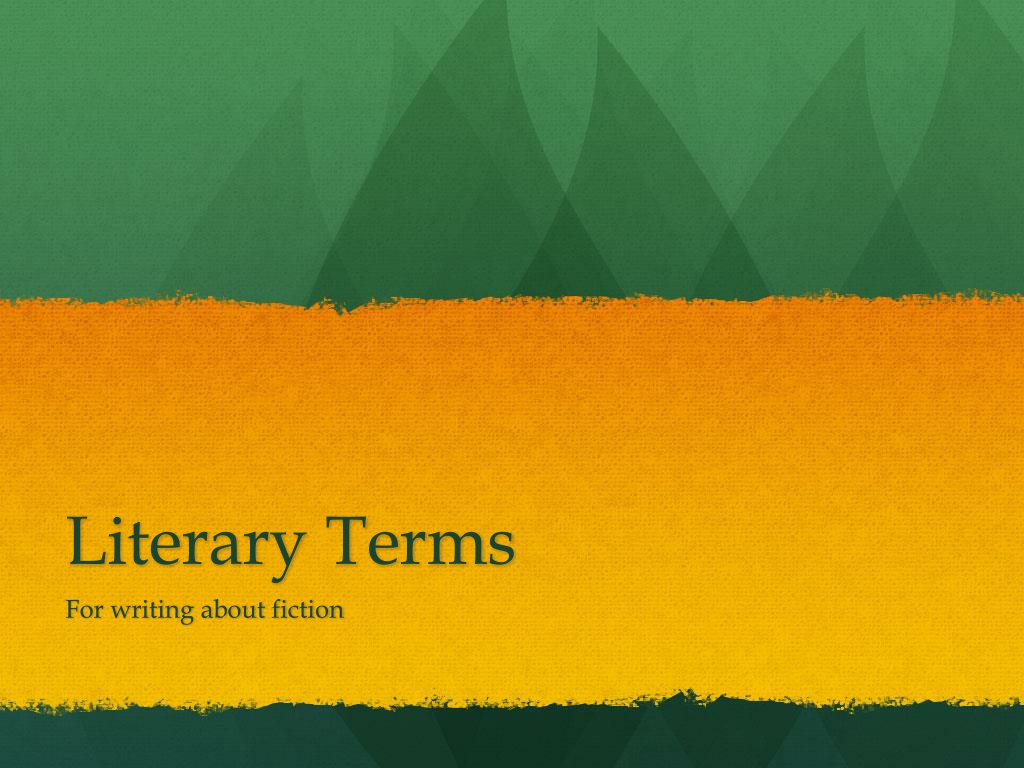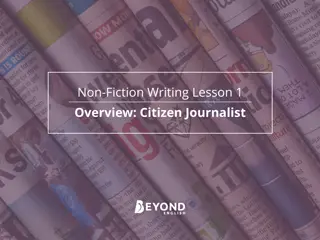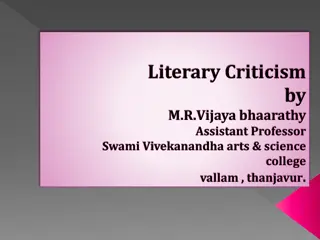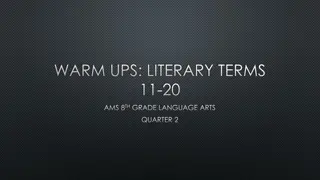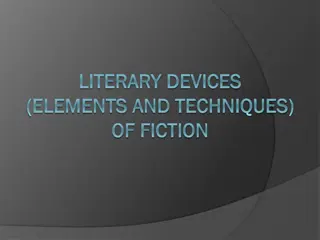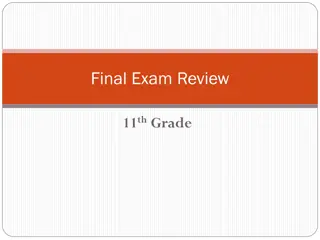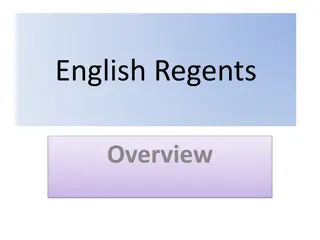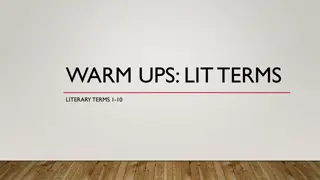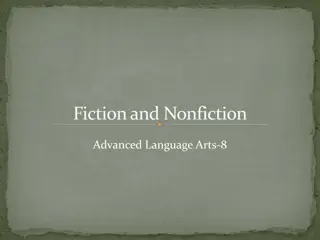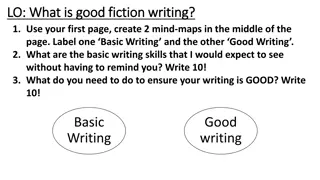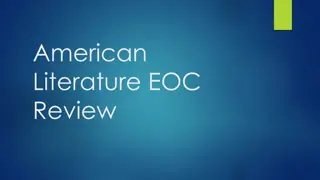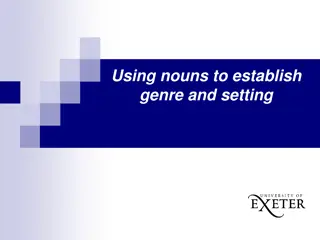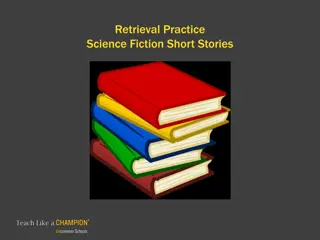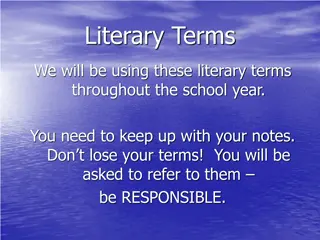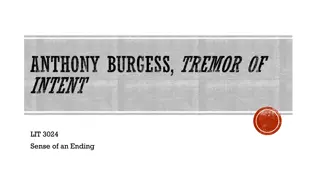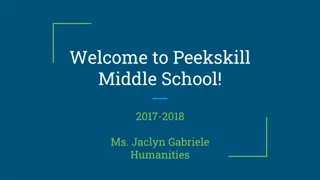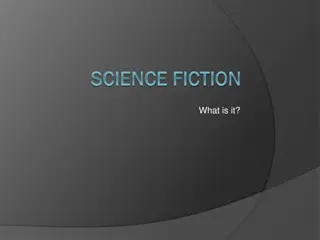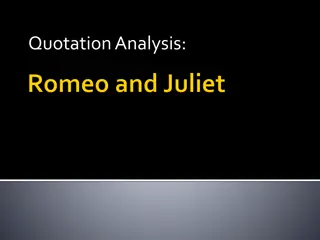Essential Literary Terms for Fiction Writing
Learn about key literary terms essential for writing about fiction, including concepts like protagonist, antagonist, connotation, denotation, figurative language, narrator, and setting. Understand the nuances of each term to enhance your understanding and analysis of fictional works.
Download Presentation

Please find below an Image/Link to download the presentation.
The content on the website is provided AS IS for your information and personal use only. It may not be sold, licensed, or shared on other websites without obtaining consent from the author.If you encounter any issues during the download, it is possible that the publisher has removed the file from their server.
You are allowed to download the files provided on this website for personal or commercial use, subject to the condition that they are used lawfully. All files are the property of their respective owners.
The content on the website is provided AS IS for your information and personal use only. It may not be sold, licensed, or shared on other websites without obtaining consent from the author.
E N D
Presentation Transcript
Literary Terms For writing about fiction
Antagonist: A character in a story or poem who deceives, frustrates, or works against the main character, or protagonist, in some way. The antagonist does not necessarily have to be an person. It could be death, the devil, an illness, or any challenge that prevents the main character from living happily ever after."
Connotation: An association that comes along with a particular word. Connotations relate not to a word s actual meaning, or denotation, but rather to the ideas or qualities that are implied by that word the word s emotional impact (for example, consider the connotative differences between the phrases climate change versus global warming ).
Denotation: The exact meaning of a word, without the feelings or suggestions that the word may imply. It is the opposite of connotation in that it is the dictionary meaning of a word, without attached feelings or associations. The dictionary definition.
Figurative language: A type of language that varies from the norms of literal language, in which words mean exactly what they say. Figurative language does not mean exactly what it says, but instead forces the reader to make an imaginative leap in order to comprehend an author s point. It usually involves a comparison between two things that may not, at first, seem to relate to one another. Similes and metaphors are examples of figurative language.
Narrator: One who tells a story, the speaker or the voice of an oral or written work. Although it can be, the narrator is not usually the same person as the author. The narrator is one of three types of characters in a given work, (1) participant (protagonist or participant in any action that may take place in the story); (2) observer (someone who is indirectly involved in the action of a story); or (3) non participant (one who is not at all involved in any action of the story).
Protagonist: A protagonist is considered to be the main character or lead figure in a novel, play, story, or poem. It may also be referred to as the hero of a work.
Setting: The time, place, physical details, and circumstances in which a situation occurs. Settings include the background, atmosphere, or environment in which characters live and move, and usually include physical characteristics of the surroundings. Settings enable the reader to better envision how a story unfolds by relating necessary physical details of a piece of literature. A setting may be simple or elaborate, used to create ambiance, lend credibility or realism, emphasize or accentuate, organize, or even distract the reader.
In her introduction to The Ecocriticism Reader, Cheryll Glotfelty defines ecocriticism as follows: Ecocriticism Ecocriticism is the study of the relationship between literature and the physical environment . . . [it] takes an earth-centered approach to literary studies. Ecocritics and theorists ask questions like the following: How is nature represented in this sonnet? What role does the physical setting play in the plot of this novel? Are the values expressed in this play consistent with ecological wisdom? How do our metaphors of the land influence the way we treat it? How can we characterize nature writing as a genre? Ecocriticism is the study of the way that works of literature depict the environment and environmental issues.
Rhetorical Analysis Analyzing texts
The main goal of a rhetorical analysis is to employ critical reading skills in order to examine how an author writes, what rhetorical techniques s/he employs, and how the text functions. A rhetorical analysis is an essay that breaks a text into parts and then explains how the parts work together to create a certain effect whether to persuade, entertain or inform, or some combination of these.
Ethos (Credibility), or ethical appeal means convincing by the character of the author.
Pathos (Emotional) means persuading by appealing to the reader's emotions.
Logos (Logical) means persuading by the use of reasoning.
Sample Genres Peer-reviewed journal articles, trade journal or magazine articles, editorials, and blogs
Peer-Reviewed Journal Article A peer-reviewed journal article is a scholarly document written by professionals in specific fields of study. In order to ensure that the work is accurate, appropriately documented, and informed by other relevant scholarship, such a text undergoes peer review by other experts in the field prior to publication. The audience for this kind of writing consists of other scholars and professionals in the field, and the text generally consists of terminology that might be unfamiliar to someone outside of that field. Generally speaking, such a document posits an argument of some kind then provides evidence in support of it.
Sample text from a Peer- Reviewed Journal Article As we shall discover, McCarthy s fiction, especially The Road, engages a pseudoscientific approach to mythic, often apocalyptic, themes and seeks to efface contemporary understandings of science. The problem with a work of fiction engaging with this relativism lies in its cultural influence the prizewinning work of a MacArthur genius grant holder serves to further popularize such relativistic approaches to science and to obscure traditional science. (Thiess 533) [academic scholarly journal]
Trade Journal or Magazine Article An example of a trade journal publication is Rebecca Tuhus-Dubrow s article Cli-Fi: Birth of a Genre, which appears in the July 1, 2013 issue of the publication Dissent, a quarterly publication devoted to politics and culture. This essay discusses the emergence of a specific sub-genre of science fiction, climate fiction (or cli-fi ), by providing examples of novels that explicitly engage with the concept of climate change. A trade journal or magazine publication is a more broadly accessible work written for a broader and less specialized audience. Such publications explain complex issues in ways that allow readers in any field to understand them. Such texts are generally more informative than theoretical; that is, they tend to provide and clarify information about an issue.
Sample Text from a Trade Journal The fundamental story of climate change is simple. Human behavior provoked a change in the weather, unleashing, among other effects, dangerous storms. This story should sound familiar. It s one of the oldest narratives in the human repository. The tale of Noah s ark is just one variation on the ancient flood myth, in which a deity annihilates the human race for its sins. Of course, to primitive people, fierce weather must have demanded explanation, and human wickedness supplied a readily available answer. Their more enlightened descendants knew better. They identified other causes: pressure systems and cold fronts and the like. They knew that human actions could not influence the weather. (Tuhus-Dubrow 60) [popular trade journal]
Editorial Editorials are articles generally published in newspapers or magazines that share a particular opinion about a given topic. An example of an editorial is USA Today s Climate Change vs. the GOP: Our View, which was written by the paper s editorial board.
Sample Text from an Editorial What s more, unilateral U.S. action would have little effect if reluctant industrializing countries, particularly China, cannot be persuaded to act as well. In that context, what to do and at what cost is a debate worth having. Given the increasing scientific certainty about global warming, and the likelihood that public opinion will shift in the face of ever more compelling evidence, Republicans should be thinking of ways of getting out in front of the issue. Otherwise, like climate change itself, it will overtake them before they can react.
Blogs are personally owned web pages on which individuals share their opinions about a given topic. Anyone can write a blog, so it is important to note that blogs may or may not be credible sources.
A Tale of Two Blogs: Two Conclusions? Different Messages? Talk about Why. Blog 1 Blog 2 http://wattsupwiththat.co m/2015/06/14/despite- attempts-to-erase-it- globally-the-pause-still- exists-in-pristine-us- surface-temperature-data/ http://www.carbonbrief.or g/blog/2015/02/what-do- satellites-measurements-of- the-troposphere-tell-us- about-global-temperature- (2)/
